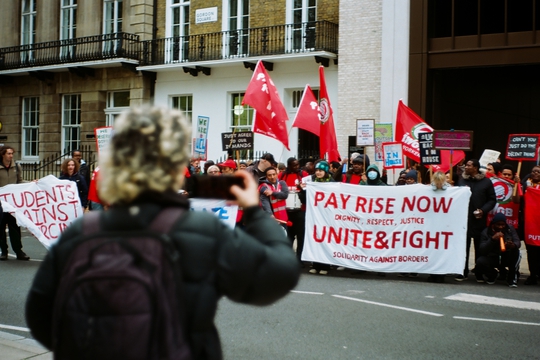How to strike and still get paid
by
Anonymous HE worker
February 9, 2023
Featured in Hot Strike Summer: View from the Picket Line (#15)
An anonymous contribution on the UCU strikes

bulletins
How to strike and still get paid
by
Anonymous HE worker
/
Feb. 9, 2023
in
Hot Strike Summer: View from the Picket Line
(#15)
An anonymous contribution on the UCU strikes
As we embark on a new round of strikes in HE, debates have broken out in several UCU branches over reporting action to employers so that they can deduct our pay. UCU provides no central guidance on this, leaving branches to take their own approach. University bosses appear to have coalesced around the use of online “strike reporting forms” which they insist are mandatory, with some HR departments even setting weekly reporting deadlines during action. Branch responses have ranged from advising members to simply comply with HR directives, to negotiating split deductions (e.g. spreading 18 days’ deductions over several months) in exchange for advising members to complete the forms as requested.
My own branch advises members to refuse to complete the employer’s form, which regularly results in many members simply not being deducted, even when said members have been very visible on the picket lines.This piece encourages members in other UCU branches to push for the same position, detailing how that can be done.
Why refuse?
If we can cause maximum disruption by striking and still get paid, there is no good reason why we shouldn’t.
Two things are key to winning this dispute: hitting as many pressure points as possible in creative ways; and sustaining action for as long as necessary. Refusing the forms supports both of these.
If senior management and their HR apparatuses are so detached from the day-to-day running of universities that they can’t tell exactly which activities are being disrupted, that’s their problem. We should turn their own organisational incompetence against them.
Relatedly, strike reporting forms are another attempt by employers to outsource yet more administrative work to non-admin staff. We should refuse this as part of broader resistance to such efforts.
Our employers often struggle to pay staff correctly in any case, particularly casualised staff. In my experience, these are the staff who are most likely to get away without deductions by not reporting, as well as being particularly effective strikers in the case of Teaching Assistants who often run many tutorials.
If we can ensure that our lowest-paid colleagues avoid deductions while still taking action, then we should. This will mean less pressure on our strike funds and more money to sustain future action.
How to refuse
There are multiple grounds on which to refuse to use strike reporting forms:
- The most basic is that they have no grounds in legislation. There is no obligation to report strike action in any particular way. Any deadlines that employers set are entirely arbitrary and penalties for missing these cannot be imposed legally.
- Data management: Where is the data stored? For how long? When and how will it be destroyed? Is it going to be used for anything else? If any of this isn’t made clear, refuse to use the forms on data protection grounds.
- Completing these forms is, in effect, providing management with a list of trade union members, which they should not have access to. Trade union detriment should be a serious concern for all of us, and is illegal under Schedule 2 of the Employment Relations Act 1999.
- Are there any ambiguous questions in the form? Jump on any details as a reason to refuse. For example, does it mention ASOS? There is no obligation to report ASOS and no questions should ask whether a member is participating in ASOS.
- Mismanagement of the forms: At some universities, several staff who completed strike reporting forms have reported being deducted twice - that is, losing six days’ pay for the three days of action taken before Christmas. Do you trust your HR department enough to avoid such mistakes, particularly in the case of more financially vulnerable colleagues?
Caveats
When bringing this to our branches, we should be clear that colleagues may still face deductions. Some branches advise members to report only when asked directly by a line manager (precisely who our line managers are can, of course, be ambiguous, allowing a great deal of discretion for the individual member). Sadly, it is not safe to lie when a line manager asks directly if you took action, but obfuscation through creative reporting should be encouraged to cause further disruption. Why not report through a series of handwritten postcards to your line manager, for example?
Migrant colleagues on Tier 2/5 visas face greater risks by not reporting strike action. Encourage those who get away with no deductions to donate the difference to your local hardship fund (if they can afford to) and encourage the most vulnerable members to apply for support. Colleagues on Tier 4 student visas who are teaching are able to get away with not reporting much the same as non-migrant staff.
Finally, this strategy depends on employer incompetence. Colleagues who avoid deductions should be careful not to declare this too loudly or publicly, at risk of the employers getting their act together. Until then, let the bosses pay for us to spend the day picketing.
author
Anonymous HE worker
Subscribe to Notes from Below
Subscribe now to Notes from Below, and get our print issues sent to your front door three times a year. For every subscriber, we’re also able to print a load of free copies to hand out in workplaces, neighbourhoods, prisons and picket lines. Can you subscribe now and support us in spreading Marxist ideas in the workplace?
Read next

1st Feb Strike Editorial
by
The University Worker
/
Jan. 31, 2023

